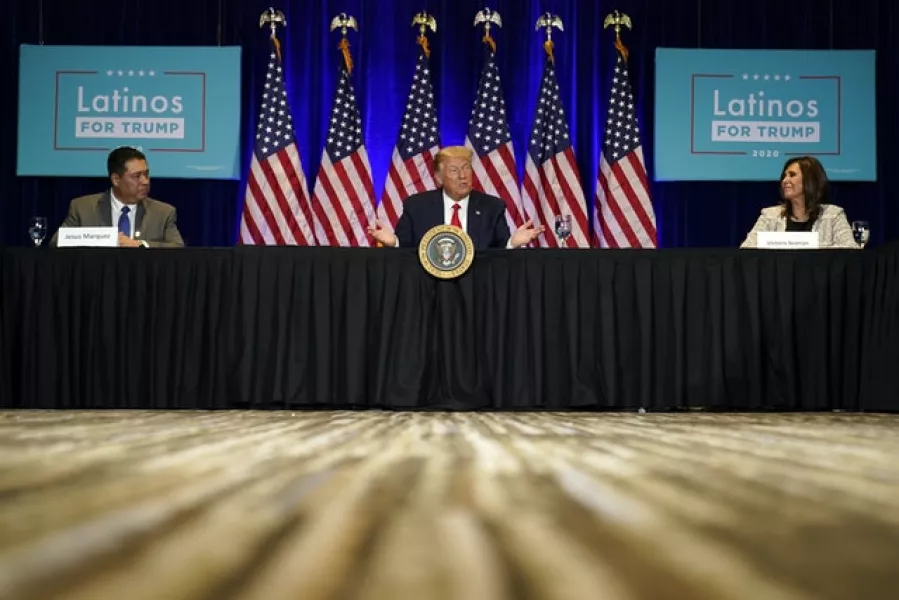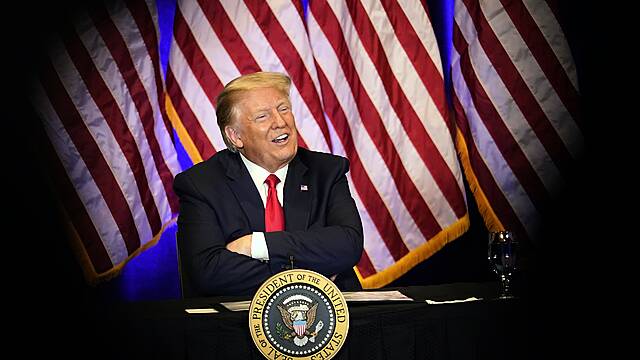The President stepped up his courtship of Latino voters on Sunday, trumpeting economic gains the demographic made before the coronavirus pandemic.
Though Mr Trump has made scores of inflammatory and derogatory comments about Latinos, his campaign is growing confident that he has won some support that could help in Florida, Arizona and his main target on the weekend – Nevada.
He hosted a round table discussion with Latinos in Las Vegas on Sunday afternoon before an evening rally, his first indoors since his disastrous outing in Tulsa, Oklahoma, which was blamed for a surge of coronavirus infections.

Winning support from Latinos has been an uphill climb for Mr Trump, whose hard-line immigration policies and sometimes virulent depiction of immigrants have alienated many Hispanics.
In the first moments of his 2016 campaign, he declared many Mexican immigrants were “rapists”. He has drawn criticism for his tepid response to a hurricane that ravaged Puerto Rico, for polices to separate children from families at the Mexican border, and for his efforts to dismantle an Obama-era program allowing young illegal immigrants who were brought to the US as children to remain in the country.
“They understand the situation at the southern border. They want people to come in, and so do I, but they want them to do it legally,” Mr Trump told a small group of supporters in Las Vegas.
“While Joe Biden has failed, I have delivered for Latinos.”
There is increasing concern about Democrats that their nominee, the former vice president, has not done enough to court Latino voters.

His running mate, California senator Kamala Harris, did little to sway Florida’s booming and politically influential Latino population during a stop there in the past week.
Biden has not set foot in Arizona or Nevada during the general election campaign, which he has mainly conducted virtually because of the coronavirus.
Mr Trump tailored his pitch to Latinos on Sunday, noting their low unemployment rate before Covid-19 and affirming his anti-abortion stance. He again hammered home his recent push on law and order, saying recent violence in American cities endangered Latinos.
“Sleepy Joe Biden has spent 47 years in politics being terrible to Hispanics. Now he is relying on Castro lover Bernie Sanders to help him out,” Mr Trump tweeted Sunday. “That won’t work!”
Mr Sanders, a Vermont senator who ran against Mr Biden in the Democratic primary but later endorsed his rival, was criticised earlier this year for a television interview in which he lauded Fidel Castro for a literacy program and asserted it was “unfair to simply say everything is bad” in Cuba.
Estimates from the Pew Research Centre and AP VoteCast show about three in 10 Latino voters supported Mr Trump in 2016 and Republican candidates in 2018. That is consistent with long-term trends in party identification among Latino voters, according to Pew.
Like Arizona and Nevada, Florida has a heterogeneous population, but Hispanic voters there tend to be somewhat more Republican-leaning than Hispanic voters nationwide because of the state’s Cuban American population. A recent Florida poll shows support from Latinos about even between Mr Trump and Mr Biden.
Nationally, little public polling is available to measure the opinions of Latino voters this year and whether they differ from four years ago. The Biden campaign has consistently denounced Mr Trump’s policies as hurting Latino immigrants and workers.

The push for Latinos comes during a Western swing in which Trump has looked to expand his paths to victory while unleashing a torrent of unsubstantiated claims that Democrats were trying to steal the election.
After holding a pair of fundraisers in the Las Vegas area on Sunday, expected to raise $18 million, Mr Trump was scheduled for an indoor rally in the warehouse of a manufacturing plant in nearby Henderson.
After abandoning rallies for months when the pandemic first arrived, Mr Trump scheduled one in June in a Tulsa arena that featured seas of empty seats and, according to local officials, prompted a spike in cases.
Recognising that many supporters were uncomfortable gathering in large groups indoors, where the virus spreads more easily, the Trump campaign shifted to holding smaller, outdoor rallies, usually at aircraft hangers. But those rallies have grown in size in recent weeks, with little social distancing and few masks.







